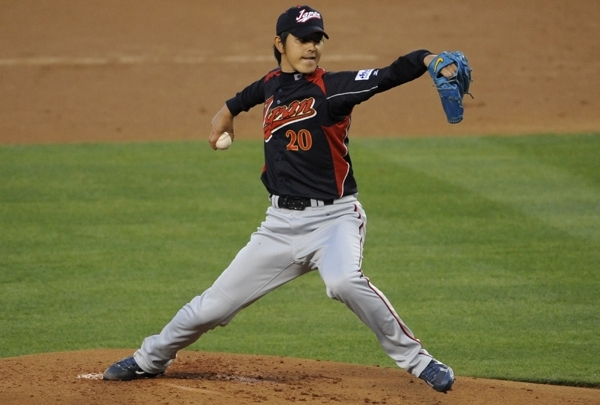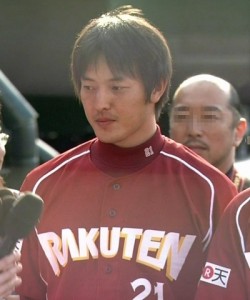Visits: 5
There are plenty of Hot Stove topics occupying the sports pages this offseason, from the Yankees/Derek Jeter saga to what team will land Cliff Lee. There’s another story developing between the West Coast and Japan that is equally as intriguing. The struggle between the Oakland A’s and Rakuten Golden Eagles right-handed ace Hisashi Iwakuma have many in Japan calling for a revision of the posting system and many in the States asking what the posting system is.
When Hideo Nomo left Japan to play in MLB, they did so because their agent, Don Nomura, found a loophole in the standard NPB contract. In Japanese baseball, a player becomes a free agent after nine years of service to a team. However, Nomo was itching to leave his native country to test his talented arm against major league batters. Nomura discovered that instead of waiting to become a free agent, Nomo could retire from NPB and leave Japan, effectively making him available to an MLB team.
So that’s what Nomo did. He retired from the Kintetsu Buffaloes, with which he won the Rookie of the Year, the MVP, and the Sawamura Award (Japan’s Cy Young) and signed a $2 million contract with the Los Angeles Dodgers in 1995. The rest is Nomomania. Hideki Irabu and Alfonso Soriano, both under the guidance of Nomura, soon followed.
As a result, the posting system was established. It went into effect in 1998 and rescinded the voluntary retirement clause, which had been nicknamed the “Nomo Clause.” The best explanation of the posting system is by Robert Whiting, in his book The Meaning of Ichiro: The New Wave from Japan and the Transformation of Our National Pastime. Here are the finer points of the agreement:
- Japanese baseball clubs, in accordance with players, post the names of available players beginning on November 1.
- Within four days of posting, interested MLB teams submit a sealed bid to the MLB commissioner.
- The MLB commissioner announces the MLB team with the highest bid.
- The highest bidder has 30 days to negotiate a deal with the Japanese player.
- If the MLB club signs the Japanese player, his NPB club keeps the bid money, or posting fee. However, if the MLB team and the NPB player do not reach an agreement, the NPB player remains with his team for one more year, and the posting fee remains with the MLB team.
The posting system tends to benefit the Japanese team, with the MLB team essentially paying twice to sign a player: Once to the team to gain the rights to negotiate, and again to the player in the form of his actual contract. The most extravagant posting fee to date is the $51 million Boston gave the Seibu Lions in 2006 for the right to sign Daisuke Matsuzaka, who signed a six-year, $52 million contract and overall has been a disappointment in Red Sox Nation.
Despite the potential for hefty contracts for the Japanese players, detractors of the posting system say that it takes away the players’ rights. Yet NPB teams are satisfied that their players are not retiring en masse to test the waters on the other side of the Pacific.
“It’s an unusual system, but it works,” says Marty Kuehnert, Senior Advisor to the Rakuten Golden Eagles. I spoke with Kuehnert in October, before Rakuten posted Iwakuma, a former 20-game and Sawamura Award winner. Kuehnert describes Iwakuma as a “super individual” who is “making a good move,” and acknowledges that it would be more financially beneficial to Rakuten if Iwakuma’s deal with the A’s goes through. The Eagles will receive a rumored $19 million if the A’s can produce an acceptable offer for Iwakuma (thus far, Oakland has not). If the A’s do not reach an agreement with Iwakuma, the pitcher returns to his Japanese team. He becomes an unrestricted free agent after next season, for which Rakuten receives nothing. However, the team would retain its best pitcher, so that should count for something.
The point of contention between the A’s and the ace is – surprise – salary! Since the A’s are factoring in the posting fee as part of the cost of acquiring Iwakuma, its offer of roughly $3.8 million a year is considerably lower than the $12 million a year that Iwakuma’s agent, the aforementioned Don Nomura, believes his client is worth. Many in the Japanese media feel that the A’s are not serious about signing Iwakuma, speculating that the mid-market club, which already has a good pitching staff, came up with the highest bid simply to keep rival AL West teams from acquiring the WBC star.
If that is the case, perhaps it’s time to revise the loopholes in the posting system, which, ironically, was created to revise a loophole. The two parties have until December 7 to reach an agreement. Until then, the cauldron of rumor and accusation continues to boil on the Hot Stove.
Editor’s Note: Below is a YouTube video of Iwakuma thanks to Susan!





